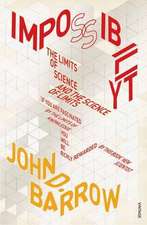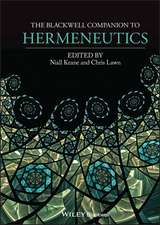Perception: Wiley Blackwell Readings in Philosophy
Autor R. Schwartzen Limba Engleză Paperback – 4 mai 2003
Perception provides the historical background on the important debates in this field, considers alternative accounts of the basis for the individuation of the senses, explores the controversy over whether perception is direct or indirect, and examines the difficulties and complexities of drawing a principled distinction between perception and conception.
This collection will interest anyone who seeks a deeper understanding of the complex problems of perception. It will also appeal to scholars in search of a compact collection of some of the best expository writing in this area.
Din seria Wiley Blackwell Readings in Philosophy
- 9%
 Preț: 824.24 lei
Preț: 824.24 lei - 9%
 Preț: 822.11 lei
Preț: 822.11 lei -
 Preț: 231.08 lei
Preț: 231.08 lei -
 Preț: 370.80 lei
Preț: 370.80 lei -
 Preț: 315.17 lei
Preț: 315.17 lei -
 Preț: 232.03 lei
Preț: 232.03 lei -
 Preț: 228.59 lei
Preț: 228.59 lei -
 Preț: 227.62 lei
Preț: 227.62 lei - 9%
 Preț: 828.06 lei
Preț: 828.06 lei -
 Preț: 307.82 lei
Preț: 307.82 lei -
 Preț: 399.79 lei
Preț: 399.79 lei -
 Preț: 401.40 lei
Preț: 401.40 lei -
 Preț: 384.52 lei
Preț: 384.52 lei -
 Preț: 454.41 lei
Preț: 454.41 lei -
 Preț: 387.61 lei
Preț: 387.61 lei - 26%
 Preț: 230.24 lei
Preț: 230.24 lei - 29%
 Preț: 229.09 lei
Preț: 229.09 lei
Preț: 318.05 lei
Nou
Puncte Express: 477
Preț estimativ în valută:
60.86€ • 63.54$ • 50.37£
60.86€ • 63.54$ • 50.37£
Carte tipărită la comandă
Livrare economică 04-18 aprilie
Preluare comenzi: 021 569.72.76
Specificații
ISBN-13: 9780631224228
ISBN-10: 063122422X
Pagini: 376
Dimensiuni: 152 x 229 x 20 mm
Greutate: 0.56 kg
Editura: Wiley
Seria Wiley Blackwell Readings in Philosophy
Locul publicării:Chichester, United Kingdom
ISBN-10: 063122422X
Pagini: 376
Dimensiuni: 152 x 229 x 20 mm
Greutate: 0.56 kg
Editura: Wiley
Seria Wiley Blackwell Readings in Philosophy
Locul publicării:Chichester, United Kingdom
Public țintă
graduate and advanced undergraduate students, academics and general readers interested in philosophy, psychology, cognitive science, computer vision, and visual scienceNotă biografică
Descriere
This text presents classic essays on the conceptual and theoretical problems in the study of vision. In a style that is accessible to the non-expert, it lays out core issues in the theory of vision and then sets up a dialogue on the topics among philosophers and psychologists, past and present.




















